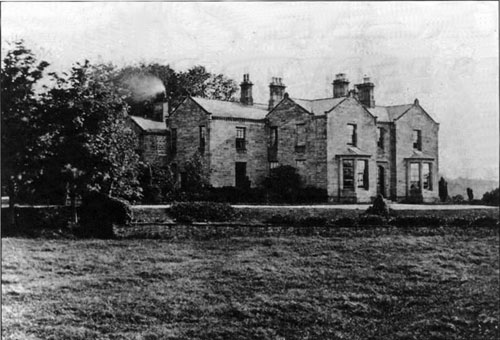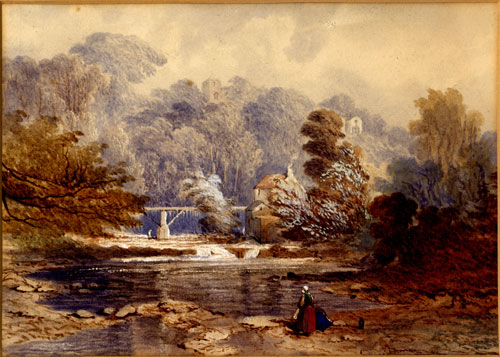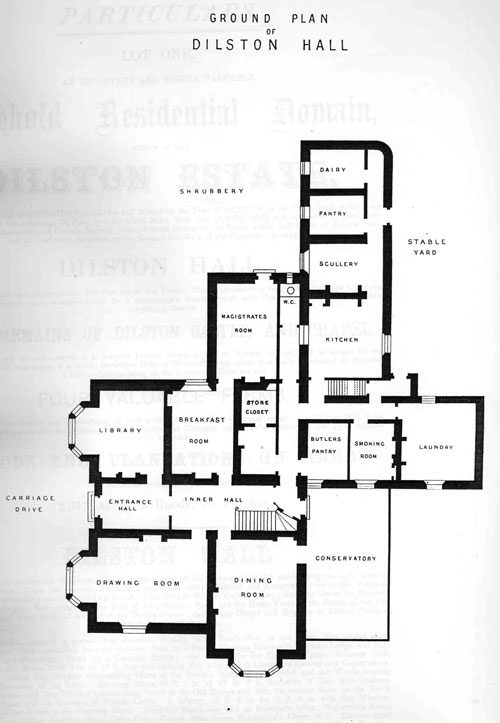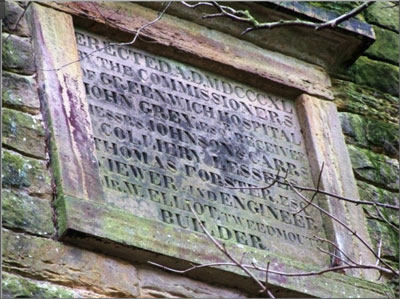
Legend that still lives
By Journal Reporter
OUTSIDE the entrance to Middleton Hall, near Belford, a faded notice bears the legend: "Greenwich Hospital Estates."
It is a Royal Foundation that few people in Northumberland have heard about, yet the trust was once one of the biggest landowners in the county.
Today, the trust's Northern Estates comprise 10,000 acres of land, 18 farms, about 70 houses, and a few mineral royalties.
The foundation's man-in-the-North is Mr. George Thomson, estate agent and a former RAF pilot.
He said last night: "Very few people do know about us, but it's a very necessary charity."
Thanks The foundation is a charity for the benefit of seafaring men, their widows, and their children, the equivalent of the Army's Chelsea Hospital.
It was founded by King William and Queen Mary on the site of a former Royal palace at Greenwich in London, as an expression of the nation's thanks to the Royal Navy.
To the design, largely, of Sir Christopher Wren, a hospital and a school were built on the site between 1694 and 1758.
The money for the project came from Royal and Parliamentary grants, the proceeds of various fines, forfeitures and special taxes, and private subscriptions.
Income When Captain Kidd was executed at Tyburn for piracy, his effects were granted to Greenwich Hospital, and when the Earl of Derwentwater was executed for high treason in 1715, his Northern estates were confiscated and also transferred to the foundation.
Greenwich Hospital closed in 1865 and the school was moved to Ipswich in 1933.
Trustee of the Greenwich Hospital is the Ministry of Defence.
The trust's gross annual income is about £680,000 of which about £41,200 comes from the Northern estates.
Mr Thomson said: “By far the largest amount goes on educating about 700 children at the school, and the rest goes on pensions and grants to deserving naval officers and men and to widows of seamen.
"We've got land in pockets all over the country and revenue comes in the form of rents. We're actually doing very well at the moment"
From the Newcastle Journal 2 Feb 1973


Dilston. In 1833 John Grey was appointed to take charge of the Greenwich Hospital Estates. Josephine Butler described the family 's move from Milfield Hill in "Memoir of John Grey of Dilston"
" The transit to the new home could not be accomplished all at once. The family was divided for a time, the younger part remaining at Milfield Hill. It was decided that a house should be built for the Receiver, conveniently situated in the midst of the property. My father and mother were allowed to choose a site. They wandered together on a beautiful summer evening along the banks of a picturesque mountain stream, the Devil's Water, about a mile above its junction with the Tyne. The evening sunshine fell full upon a wooded height rising abruptly above the stream, and commanding an open view of the country round. My mother said it would be a beautiful spot to fix the house ; and there it was built, only a few yards from the ruins of the ancient castle of the Radcliffes, and from a little chapel in which lies the body of the gentle and virtuous Earl James, with his head under his arm, and his heart embalmed in a box by the side of his coffin."



Right: Watercolour of Dilston with a very faint date which may be 1868.
The Hull Packet (Hull, England), Friday, November 22, 1833; Issue 2557. GREENWICH HOSPITAL- ANOTHER WHIG JOB. - It will be remembered that, some time ago, a change took place in the management of the Greenwich Hospital property, by granting retiring pensioners to its principal officers and appointing John Grey, Esq. of Milfield, (reputedly to be distantly related to Earl Grey), to the office of Receiver General, at a salary of £1000 per annum. We said at the time that this was done by the Whig government, ostensibly, under the plausible pretext of economy, but in reality, to get a snug birth for a Greyling. We have now to mention a circumstance which proves our definition of the “the job” to be correct; the Grey government, we have reason to know, having recently made a grant to Mr. Grey, the new receiver of the rents, of a sum £2000 for the purpose of building a handsome house at Dilstone, the near the site of the ancient residence of the unfortunate Earl of Derwentwater. If this act wanted comment, beyond its bare mention, which it does not, to convince the public of its gross flagrancy, we need only add that the town of Hexham is more central for a “residence” for the Receiver of the Greenwich Hospital rents, than Dilstone; that a excellent house might be rented there for £40 or £50 per annum; and that probably, it would only be proper that Mr. John Grey should pay the rent out of his own large salary. Surely this system of rewarding political partizans, of which we have furnished many glaring instances, will some time have a termination. -Newcastle Journal.

Left: A plaque on the side of Scremerston Colliery. Erected AD MDCCCXL. (1840) By the Commissioners of Greenwich Hospital John Grey Esq. Receiver Messrs Johnson & Carrs Colliery Lessees, Thomas Forster Esq. Viewer and Engineer, Mr. W. Elliot, Tweedmouth Builder"
John Grey of Dilston was receiver for the Greenwich Hospital estates from 1833 to 1863.
Thanks to Ian Castledine for permission to use his photograph. You can see more of the remains of the colliery on his web site here.
SPITTAL RAILWAY AND MR. JOHN GREY. The exposure of the gross job attempted to be affected by certain agents of the Greenwich Hospital Estates, by the introduction to Parliament, under the sanction of the Lords of the Admiralty, of a Bill entitled "The Greenwich Railway Bill," the object of which is to compel the owners of freehold estates in the route of a proposed railway from Scremerston Colliery New Winning to Spittal, to part with so much of their private property as may be required by the Hospital Commissioners, has elicited an unwarrantably vulgar and abusive letter from Mr. John Grey, the Agent of the Commissioners, denying in coarse and vituperative terms certain statements which we considered it our duty to advance on authority which we deemed, and do still deem, unquestionable. The Commissioners of Greenwich Hospital, we are fully persuaded, are wholly ignorant of the real merits of the case, which, it would seem, has been represented to them in a form different to that in which it actually exists, or they would never have contemplated a measure so much at variance with the constitutional rights of private individuals, and the practice which has prevailed in mining districts from time immemorial, of making of making private arrangements with the owners of property under the well-understood system of "way-leave." Mr. Grey, with much apparent indignation, repudiates and denies having acted “in the double capacity of lessee of the Hospital Colliery of Scremerston, and the agent of their property." He even goes so far as to declare the assertion that he has done so "a most unqualified falsehood." Entertaining, as we do, a very proper estimate of Mr Grey’s scrupulousness on any subject, we are certainly not disposed to receive his disavowal, as against a positive declaration of the solicitors who have prepared the draft of the Hospital Bill, and who affirm, in the schedule annexed to the Bill, that this said individual is, with others, a lessee or reputed lessee of the Scremerston Colliery New Winning, and, not only so, but an actual occupier, under the Hospital Commissioners, for whom he acts as an agent. Mr Grey asserts further, that he "never, in the course of his life, had any personal interest or concern whatever in that colliery." Against this assurance we again place the declaration of the Solicitors to the Bill, who set forth Mr. Grey's interest in the colliery, and the grounds and works connected therewith, through a list of no less than eleven specifications, in all of which, with the exception of a bent and garden or cabbage-garth, his name appears not only as a lessee or reputed lessee, but as an occupier. Can evidence of the fact be more satisfactory or conclusive? We are at a loss to account for Mr Grey’s effrontery in this matter, except upon the charitable supposition that he has not had an opportunity of reading the schedule annexed to the Bill, which proclaims him to be more deeply interested in this iniquitous project than any other single individual whose name appears in connexion with it. But, it would seem that Mr Grey's own friends deem his denial insufficient: for, in the course of yesterday, a communication was brought to this office, which is published as an advertisement in another part of our paper, and bears the signature of Mr. John Carr, of whom we desire to speak with all proper respect, "on behalf of himself and the lessees of Scremerston Colliery," in which communication it is stated that "although the name of Mr Grey appears in the schedule attached to the act of Parliament, it does so only as Trustee." Now, we must take the liberty of correcting Mr. Carr in this particular. The name of Mr. Grey does not appear in the schedule as Trustee, the only Trustees mentioned in the schedule being Lord Crewe’s Trustees, and the Trustees of the Berwick and North Durham Turnpike Roads. The names of Lord Crewe’s Trustees are severally recorded, and their character of trustees directly specified. This is not the case with Mr John Grey, whose name does not appear as a Trustee, that as a lessee or reputed lessee of the premises described, of which also, with the exception of a bent or cabbage garden, he is scheduled as an occupier. Nothing can be more conclusive on the point; and, to prove the correctness of our statement, we reprint from the schedule annexed to the Act, a list of the various properties in connexion with which Mr. Grey's name appears:- Township of Scremerston and Parish of Ancroft. COLLIERY, called SCREMERSTON NEW WINNING, or Greenwich Colliery. Owners or Reputed Owners. – The Commissioners of Greenwich Hospital. Lessees, or reputed Lessees. – Robert Johnson and Patience his wife, John Carr, George Carr, William Carr, the Reverend Edward Henry Carr, Charles Carr, Martin Morrison and Mary his wife, JOHN GREY, and Thomas Cargill. Occupiers.- Robert Johnson and Patience his wife, John Carr, George Carr, William Carr, the Reverend Edward Henry Carr, Charles Carr, Martin Morrison and Mary his wife, JOHN GREY, and Thomas Cargill. ENGINE-HOUSE, ROAD and WASTE LAND. Owners or Reputed Owners. – The Commissioners of Greenwich Hospital. Lessees, or Reputed Lessees. – Robert Johnson and Patience his wife, John Carr, George Carr, William Carr, the Reverend Edward Henry Carr, Charles Carr, Martin Morrison and Mary his wife, JOHN GREY, and Thomas Cargill. Occupiers.- Robert Johnson and Patience his wife, John Carr, George Carr, William Carr, the Reverend Edward Henry Carr, Charles Carr, Martin Morrison and Mary his wife, JOHN GREY, and Thomas Cargill. TRAMROAD or RAILWAY. Owners or Reputed Owners. – The Commissioners of Greenwich Hospital. Lessees, or Reputed Lessees. – Robert Johnson and Patience his wife, John Carr, George Carr, William Carr, the Reverend Edward Henry Carr, Charles Carr, Martin Morrison and Mary his wife, JOHN GREY, and Thomas Cargill. Occupiers.- Robert Johnson and Patience his wife, John Carr, George Carr, William Carr, the Reverend Edward Henry Carr, Charles Carr, Martin Morrison and Mary his wife, JOHN GREY, and Thomas Cargill. FRICTION WHEEL-HOUSE. Owners or Reputed Owners. – The Commissioners of Greenwich Hospital. Lessees, or Reputed Lessees. – Robert Johnson and Patience his wife, John Carr, George Carr, William Carr, the Reverend Edward Henry Carr, Charles Carr, Martin Morrison and Mary his wife, JOHN GREY, and Thomas Cargill. Occupiers.- Robert Johnson and Patience his wife, John Carr, George Carr, William Carr, the Reverend Edward Henry Carr, Charles Carr, Martin Morrison and Mary his wife, JOHN GREY, and Thomas Cargill. CARRIAGE ROAD. Owners or Reputed Owners. – The Commissioners of Greenwich Hospital. Lessees, or Reputed Lessees. – Robert Johnson and Patience his wife, John Carr, George Carr, William Carr, the Reverend Edward Henry Carr, Charles Carr, Martin Morrison and Mary his wife, JOHN GREY, and Thomas Cargill. Occupiers.- Robert Johnson and Patience his wife, John Carr, George Carr, William Carr, the Reverend Edward Henry Carr, Charles Carr, Martin Morrison and Mary his wife, JOHN GREY, and Thomas Cargill and George Pringle and Edward Hawke Locker Pringle. ENGINE HOUSE in ruins and waste land. Owners or Reputed Owners. – The Commissioners of Greenwich Hospital. Lessees, or Reputed Lessees. – Robert Johnson and Patience his wife, John Carr, George Carr, William Carr, the Reverend Edward Henry Carr, Charles Carr, Martin Morrison and Mary his wife, JOHN GREY, and Thomas Cargill. Occupiers.- Robert Johnson and Patience his wife, John Carr, George Carr, William Carr, the Reverend Edward Henry Carr, Charles Carr, Martin Morrison and Mary his wife, JOHN GREY, and Thomas Cargill. Parish or Chapelry of Tweedmouth, Township of Spital. TRAMROAD or RAILWAY and sand. Owners or Reputed Owners. – The Commissioners of Greenwich Hospital. Lessees, or Reputed Lessees. – Robert Johnson and Patience his wife, John Carr, George Carr, William Carr, the Reverend Edward Henry Carr, Charles Carr, Martin Morrison and Mary his wife, JOHN GREY, and Thomas Cargill. Occupiers.- Robert Johnson and Patience his wife, John Carr, George Carr, William Carr, the Reverend Edward Henry Carr, Charles Carr, Martin Morrison and Mary his wife, JOHN GREY, and Thomas Cargill. BENT. Owners or reputed Owners. – The Commissioners of Greenwich Hospital. Lessees, or Reputed Lessees. – Robert Johnson and Patience his wife, John Carr, George Carr, William Carr, the Reverend Edward Henry Carr, Charles Carr, Martin Morrison and Mary his wife, JOHN GREY, and Thomas Cargill. Occupier.-Stephen Scott. GARDEN. . Owners or Reputed Owners. – The Commissioners of Greenwich Hospital. Lessees, or Reputed Lessees. – Robert Johnson and Patience his wife, John Carr, George Carr, William Carr, the Reverend Edward Henry Carr, Charles Carr, Martin Morrison and Mary his wife, JOHN GREY, and Thomas Cargill. Occupier.-Stephen Scott. BENT. Owners or reputed Owners. – The Commissioners of Greenwich Hospital. Lessees, or Reputed Lessees. – Robert Johnson and Patience his wife, John Carr, George Carr, William Carr, the Reverend Edward Henry Carr, Charles Carr, Martin Morrison and Mary his wife, JOHN GREY, and Thomas Cargill. Occupiers.- Robert Johnson and Patience his wife, John Carr, George Carr, William Carr, the Reverend Edward Henry Carr, Charles Carr, Martin Morrison and Mary his wife, JOHN GREY, and Thomas Cargill. COAL JETTIES. Owners or reputed Owners. – The Commissioners of Greenwich Hospital. Lessees, or Reputed Lessees. – Robert Johnson and Patience his wife, John Carr, George Carr, William Carr, the Reverend Edward Henry Carr, Charles Carr, Martin Morrison and Mary his wife, JOHN GREY, and Thomas Cargill. Occupiers.- Robert Johnson and Patience his wife, John Carr, George Carr, William Carr, the Reverend Edward Henry Carr, Charles Carr, Martin Morrison and Mary his wife, JOHN GREY, and Thomas Cargill. Now, as to the dissolution of partnership, Mr. Grey having hazarded a denial of the charge of having acted in the double capacity of a lessee of the Hospital’s Colliery of Scremerston, and the agent of their property, presumes on the boldness of that denial to give the "go by" to the important fact, that a dissolution of partnership ship took place in so far as he was concerned some two years ago. Mr. Grey does not deny that such was the case, nor does Mr. Carr make the slightest allusion to the circumstance. But, in a whirlwind of abuse, characteristic of the vulgar mind adopting it, Mr. Grey challenges us to the proof. What proof does Mr. Grey require? We are cognizant of such facts only, or so much of them, as may come before the public, and if a written official document, about to be embodied in an act of Parliament, is rejected as evidence, we are at a loss to know the nature of the evidence that will be received. But, admitting that Mr. Grey's name appears in the schedule in the character of Trustee only, though such is not the fact, he is bound to look after the interests of the parties for whom he acts as lessee, as much or more so than his own. As the matter stands, therefore, we appeal to any impartial tribunal, as to whether we were not fully justified in denouncing as we did the scandalous job attempted to be perpetrated under the sanction of an act of Parliament? But, there is another part of Mr. Grey’s vituperative epistle, which it is necessary to notice, if only for the purpose of showing the public how this zealous agent of the Greenwich Hospital Commissioners can trifle with the truth to suit his purposes. Mr. Grey states that the consent of the Corporation of Berwick, as Lords of the Manor, was given to the bill, at a meeting of their Town Council, "on condition that the Hospital should make a public carriage road over the Slake, now hardly passable between Spittal and Tweedmouth, and supply the public with suitable crossings for access to the river in all needful places." Now, we have it on much better authority than Mr. Grey’s ipse dixit, that the council did not consent to the Bill on that or any other specific condition. That, in fact, the consent of the Council never was given to the bill, except with a proviso that completely nullifies it. For, these are the words of the resolution adopted by the Council, namely – "That the Town Clerk be authorised to write to the Commissioners to say, that the council assent to the undertaking, provided that there be nothing in the bill prejudicial to the interests of the Corporation or the Public." It is true, a Committee of the Council recommended the Council "to withdraw their opposition, and procure, if they could, a good retaining wall, so as to form a road to Spittal," but it does not appear the Council ever adopted that recommendation. On the contrary, only on Tuesday in last week, the Council, by a majority of nine to two, in a special meeting, convened for the purpose of taking the subject into consideration, adopted petitions to both Houses of Parliament against the bill, and praying to be heard in opposition to it by themselves, their counsel, and their witnesses. In the course of the discussion that took place on the motion for adopting these petitions, one gentleman said, a more objectionable Bill he had never seen. The Commissioners had embodied into it, he continued, all the clauses of the Railway Consolidation Bill, and thus far a scheme, exclusively a private one, secured all the privileges of a public measure. Not merely did the Commissioners propose to appropriate private ground, he added, but they go over one-half of the harbour, for which no remuneration or compensation was to be given. The Berwick Councillors were not to be entrapped by the causistry of Mr. John Grey, and the other promoters of this nefarious scheme, and no sooner did they become acquainted with the details of the proposed measure, and the contemplated mode of carrying it into execution, than they resolved to resist it. Their motives were obvious. They neither changed their views nor retracted their promises, as impudently asserted by Mr. Grey, but have adhered to both with a degree of consistency that might be expected to be displayed by a public body, constituted by law, as the guardians of local interests, and responsible to the inhabitants of the borough for the discharge of their important functions. Mr. Greys "code of morality" may differ somewhat from the Christian standard, but he has no right to impute to others the commission of a crime, which his own familiarity with tergiversation, may induce him to regard with complacency when he himself is the perpetrator. The Commissioners of Greenwich Hospital would only act a proper and consistent part in withdrawing the Bill altogether from the notice of Parliament, where, it will be seen by our report of the proceedings, it is destined to encounter a most determined opposition. The fact of such opposition being conducted by Mr. Hodgson Hinde, Mr. Bell, Mr. Hodgson, Mr. Forster, Mr. Liddell, and other members connected with the locality affected is a presumptive proof, were all others absent, that the provisions of the Bill would be highly injurious to the interests of the public and confer powers on a few private individuals over the property of others which no mere trading company ought to possess. We have denounced this measure as a "gross job," and such it undoubtedly is, to all intents and purposes, and as such we trust it will be rejected by Parliament, when the whole case is laid before it. Of the low disgusting personalities and Billingsgate phrases in which Mr. John Grey has thought proper to indulge, we will not condescend to take any notice. We regard them and their author with supreme contempt and indifference, and define his malice and bitter partizanship, as we ever have done. We may remind him, however, that a good cause needs no violence of language to sustain it – that he is over-zealous and to fiery and indiscreet for a useful public servant, and that those who make the last loudest professions of "candour and honesty," are sometimes found lamentably deficient in these qualifications. The Newcastle Journal 12 April 1845






